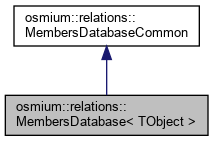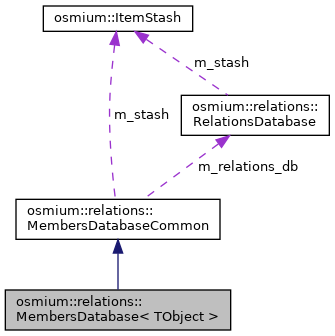#include <members_database.hpp>
Inheritance diagram for osmium::relations::MembersDatabase< TObject >:

Collaboration diagram for osmium::relations::MembersDatabase< TObject >:

Public Member Functions | |
| MembersDatabase (osmium::ItemStash &stash, osmium::relations::RelationsDatabase &relation_db) | |
| template<typename TFunc > | |
| bool | add (const TObject &object, TFunc &&func) |
| const TObject * | get (osmium::object_id_type id) const |
 Public Member Functions inherited from osmium::relations::MembersDatabaseCommon Public Member Functions inherited from osmium::relations::MembersDatabaseCommon | |
| std::size_t | used_memory () const noexcept |
| std::size_t | size () const noexcept |
| counts | count () const noexcept |
| void | track (RelationHandle &rel_handle, osmium::object_id_type member_id, std::size_t member_num) |
| void | prepare_for_lookup () |
| void | remove (osmium::object_id_type member_id, osmium::object_id_type relation_id) |
| const osmium::OSMObject * | get_object (osmium::object_id_type id) const |
Detailed Description
template<typename TObject>
class osmium::relations::MembersDatabase< TObject >
class osmium::relations::MembersDatabase< TObject >
A MembersDatabase is used together with a RelationsDatabase to bring a relation and their members together. It tracks all members of a specific type needed to complete a relation.
More documentation is in the MembersDatabaseCommon parent class which contains all the pieces that aren't dependent on the template parameter.
- Template Parameters
-
TObject The object type stores in the members database. Can be osmium::Node, Way, or Relation.
Constructor & Destructor Documentation
◆ MembersDatabase()
template<typename TObject >
|
inline |
Construct a MembersDatabase.
- Parameters
-
stash Reference to an ItemStash object. All member objects will be stored in this stash. It must be available until the MembersDatabase is destroyed. relation_db The RelationsDatabase where relations are stored. Usually it will use the same ItemStash as the MembersDatabase.
Member Function Documentation
◆ add()
template<typename TObject >
template<typename TFunc >
|
inline |
Add the specified object to the database.
- Parameters
-
object Object to add. func If the object is the last member to complete a relation, this function is called with the relation as a parameter.
- Returns
- true if the object was actually added, false if no relation needed this object.
- Precondition
- You have to call prepare_for_lookup() before using this.
◆ get()
template<typename TObject >
|
inline |
Find the object with the specified id in the database and return a pointer to it. Returns nullptr if there is no object with that id in the database.
- Precondition
- You have to call prepare_for_lookup() before using this.
Complexity: Logarithmic in the number of members tracked (as returned by size()).
The documentation for this class was generated from the following file:
- include/osmium/relations/members_database.hpp